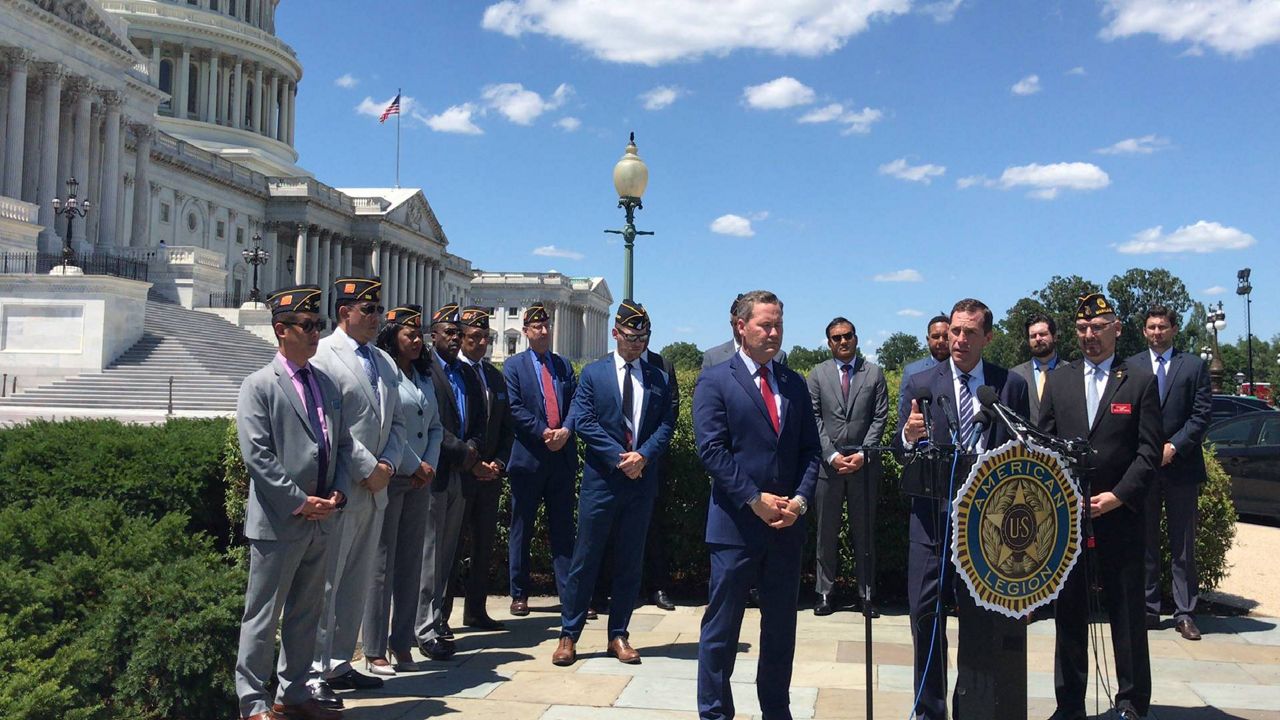A bipartisan pair of lawmakers said Wednesday they’ve had multiple conversations and “good” meetings with Biden administration officials about aiding Afghan interpreters and other allies, people who helped the U.S. during the war in Afghanistan and are threatened for their work by groups like the Taliban.
Reps. Michael Waltz, R-Fla., and Jason Crow, D-Co., spoke at a press conference hosted by American Legion, a veterans services group, on Capitol Hill.
The two are among a growing number of lawmakers, advocates and veterans calling for a speedy evacuation of Afghan interpreters from their home country as the United States continues its military withdrawal. Most have suggested airlifting them to a U.S. territory like Guam to finish their visa processing, a possibility Guam officials said they’re prepared for.
But despite the bipartisan support for Afghan allies in Congress, the Biden administration has not agreed that an evacuation is necessary, instead focusing on the processing of visas through a special program set up to help interpreters. Approximately 18,000 Afghans have applied and the majority are in the beginning stages of the process, which often takes years to complete.
On Wednesday, Reps. Waltz and Crow said they’ve spoken to administration officials about the issue multiple times in recent weeks, including briefings with the National Security Council.
“There actually has been a series of engagements, good engagements,” Waltz said. “[But] when are we going to see action? Because we're running out of runway, we're running out of time.”
Pressure has been building for President Joe Biden to take action to protect Afghans more immediately than through the current visa program.
Interpreters have told Spectrum News that both their lives and their family’s lives are directly threatened by the Taliban, especially once the U.S. leaves the country by September 11.
Veterans, like Rep. Crow, have stressed the critical and life-saving nature of interpreters’ service.
“I may not be here today, standing in front of you, with the honor of representing the state of Colorado, had it not been for brave Afghan and Iraqi interpreters, translators and others who stood by me, fought with me shoulder to shoulder, warned me of risks helped us get our mission done,” he said Wednesday.
“People need to know that the American handshake matters,” he added. “We will have future conflicts and adversaries. And those future partners … that we will rely on are watching now.”
Crow and Waltz are part of a bipartisan working group of congressmen, many veterans, who have written letters to the president in recent months to press for an evacuation.
They’re also expected to introduce a legislative package Thursday to increase the number of Special Immigrants Visas (SIVs) available to Afghans by 8,000 and speed up the application process by waiving some requirements, though the proposal wouldn’t alter security vetting requirements.
Multiple defense officials have said publicly that the Pentagon is already “rapidly” planning for an evacuation if one is called for, though a spokesperson for the Joint Chiefs of Staff told Spectrum News it’s not the “primary option.”
Lawmakers said the decision comes down to the White House and a “policy decision” from the president to call for the evacuation.
“I want to be clear, if he doesn't act, and he doesn't get these people out, blood will be on his hands and on his administration's hands,” Rep. Waltz said Wednesday. “I, for one, will very publicly and very loudly hold him accountable.”
Rep. Crow told Spectrum News Wednesday that Congress would also likely fund an evacuation if necessary, since the issue is bipartisan.
In the meantime, Secretary of State Antony Blinken told CNN this week that evacuation is the “wrong word” and that the department is hyper-focused on processing visas as quickly as possible.
The secretary said they plan to add 50 staff members in Washington, D.C. by the end of July and that they’ve made progress on the backlog of thousands of SIV applicants in recent weeks.
Meanwhile, the U.S. embassy in Kabul, Afghanistan paused visa processing indefinitely Sunday due to a COVID-19 outbreak, a closure that mostly impacts applicants in the final stages of approval, such as the visa interview.
A State Department official told Spectrum News they hope to reopen as soon as it’s “safe to do so” and will reschedule impacted appointments, though it’s unclear when that could happen.



